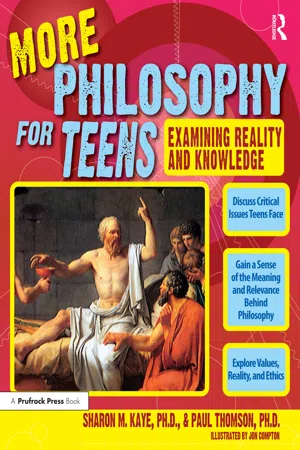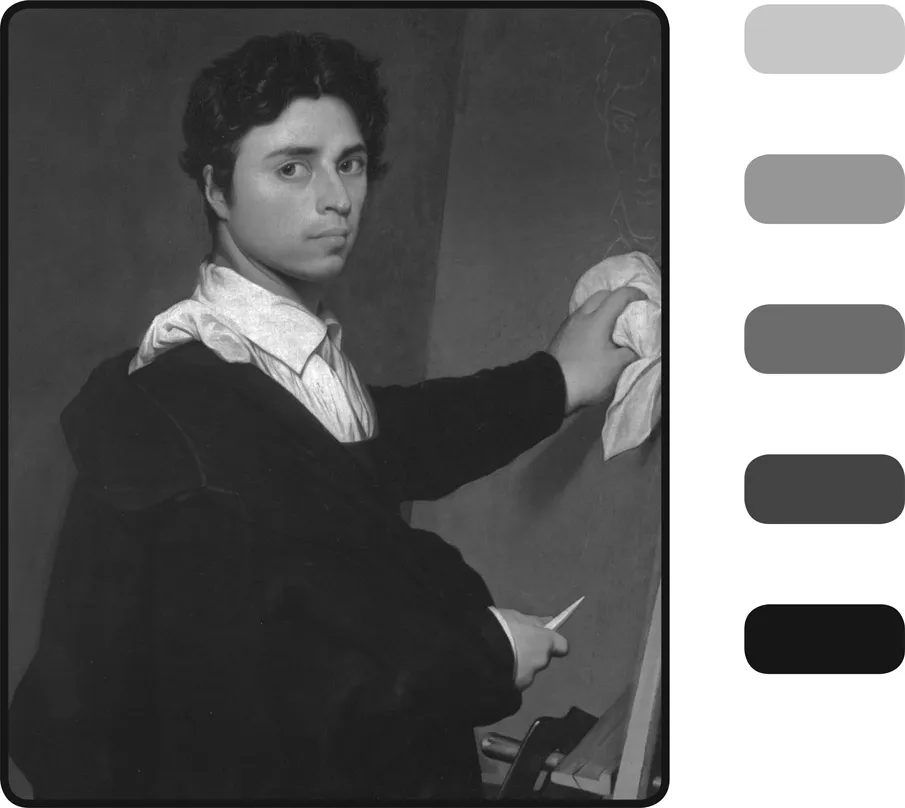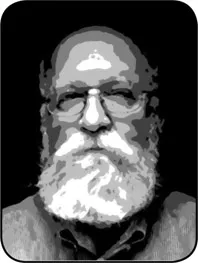
eBook - ePub
More Philosophy for Teens
Examining Reality and Knowledge (Grades 7-12)
- 204 pages
- English
- ePUB (mobile friendly)
- Available on iOS & Android
eBook - ePub
About this book
Is knowledge the greatest virtue? What is it like to be somebody else? What if tomorrow never comes? Is the world around us real? Your students will be asking these challenging questions and more after reading and completing the activities in More Philosophy for Teens. A companion to the best-selling Philosophy for Teens, this volume tackles the topics of reality and knowledge in a teenager-friendly format.
The authors examine some of life's toughest questions, including identity, God, the universe, freedom, and the meaning of life. Both sides of the debates are covered on every issue, with information from some of the world's most noted philosophers included in a conversational style that teenagers will love.
Grades 7-12
Frequently asked questions
Yes, you can cancel anytime from the Subscription tab in your account settings on the Perlego website. Your subscription will stay active until the end of your current billing period. Learn how to cancel your subscription.
No, books cannot be downloaded as external files, such as PDFs, for use outside of Perlego. However, you can download books within the Perlego app for offline reading on mobile or tablet. Learn more here.
Perlego offers two plans: Essential and Complete
- Essential is ideal for learners and professionals who enjoy exploring a wide range of subjects. Access the Essential Library with 800,000+ trusted titles and best-sellers across business, personal growth, and the humanities. Includes unlimited reading time and Standard Read Aloud voice.
- Complete: Perfect for advanced learners and researchers needing full, unrestricted access. Unlock 1.4M+ books across hundreds of subjects, including academic and specialized titles. The Complete Plan also includes advanced features like Premium Read Aloud and Research Assistant.
We are an online textbook subscription service, where you can get access to an entire online library for less than the price of a single book per month. With over 1 million books across 1000+ topics, we’ve got you covered! Learn more here.
Look out for the read-aloud symbol on your next book to see if you can listen to it. The read-aloud tool reads text aloud for you, highlighting the text as it is being read. You can pause it, speed it up and slow it down. Learn more here.
Yes! You can use the Perlego app on both iOS or Android devices to read anytime, anywhere — even offline. Perfect for commutes or when you’re on the go.
Please note we cannot support devices running on iOS 13 and Android 7 or earlier. Learn more about using the app.
Please note we cannot support devices running on iOS 13 and Android 7 or earlier. Learn more about using the app.
Yes, you can access More Philosophy for Teens by Paul Thomson,Sharon Kaye in PDF and/or ePUB format, as well as other popular books in Bildung & Bildung Allgemein. We have over one million books available in our catalogue for you to explore.
Information
PART 1
The Self

CHATPER 1
Who Am I?
DOI: 10.4324/9781003236757-2
The Diary
It is around 10 p.m. Mollie is phoning her friend Andreas. Andreas is in his bedroom writing in a thick notebook when he hears the phone ring and answers it.
ANDREAS: Hello?
MOLLIE: <Brightly> Hey Andreas. It’s Mollie. Am I calling too late?
ANDREAS: <Andreas is still finishing a sentence he is writing in his notebook.> Nah. I’m wide awake.
MOLLIE: <Sensing his distraction, scowling a little> Whatcha doin?
ANDREAS: <Still writing> Nothin’ much. <Suddenly embarrassed, he puts down his pen and closes the notebook.> Actually, I was writing in my journal.
MOLLIE: <Surprised> You mean—like a diary?
ANDREAS: Yeah. <He shoves the notebook under some clothing in a dresser drawer.> I’ve been writing in it almost every night since my parents got divorced last year.
MOLLIE: Wow! Do you record everything you do?
ANDREAS: No. It’s more like what I’m thinkin’ about.
MOLLIE: Oh. <She continues in a gentle voice.> Like how you’re mad at your mom for taking off with that other guy?
ANDREAS: Yeah, sometimes I write about how I feel. Sometimes I plan out my future. <He takes the notebook back out of the drawer and starts flipping through it.> Last week I recorded this really wild dream I had and tried to analyze it. <Brightening> It’s kinda cool flipping back through the notebooks. I get a sense of who I am.
MOLLIE: Hmmm …
ANDREAS: <Suddenly embarrassed again> What’s that supposed to mean?
MOLLIE: I dunno. I had a teacher once who made us keep a journal for a few weeks. We were supposed to be reflecting on “who we really are” or something. We always just made stuff up. I remember once I wrote that I thought I was the ghost of a boy in a girl’s body! <She laughs.> That was a good one. <Still laughing> The teacher ate it up!
ANDREAS: It’s not funny. Maybe some people really do feel like that….
MOLLIE: Look, Andreas, don’t get me wrong! I think it’s cool you write in a journal. But, to me it’s just like writing stories. You can make up whatever you want to be because there is no “secret you” inside to figure out. You just are who you are.
Questions
- What is the point of writing in a journal, according to Andreas?
- What is the point of writing in a journal, according to Mollie?
- With whom do you agree more, and why?
- Have you ever kept a journal? If so, what kinds of things did you write about? If not, would you ever consider keeping a journal? Why or why not?
- Suppose you were writing a journal right now. What would you say? Do you think that there is a secret “you” that writing in a journal will help you discover?

Who Am I?
Do you ever talk to yourself? You probably do. Maybe not out loud. But, what about inside your head? For example, do you ever yell at yourself when you do something stupid? (“Idiot! I can’t believe you did that again!”) Or, do you congratulate yourself when you do something good? (“Oh yeah! You rock!”) Many people say they hear a “little voice” inside their heads telling them what to do and what not to do. There’s no question that we all talk to ourselves sometimes. The question is, when you talk to yourself, who are you talking to?
Some people think every human being has a soul. They think that your soul is the real you, and it’s who you talk to when you talk to yourself. Because the soul is a nonphysical substance, it lives inside you and moves your body like a ghost in a machine. When you die, your soul can live on as a spirit without your body. This belief is an important part of many religions. Because the soul is completely invisible, however, belief in it is controversial. There is no proof that it exists.
The French philosopher René Descartes (1596–1650) believed in the existence of the soul. In his view, the soul is nothing but the mind in which all of our thoughts take place. Because the thoughts in your mind are what make you who you are, a record of your thoughts is a record of the real you.
Descartes kept a journal and published it under the title Meditations on First Philosophy. In it he argued that we know a lot more about our own minds than we know about anything else in the physical world. We may think we know a lot about the things we see and hear around us. But, our eyes and ears are often mistaken. Furthermore, when we dream, we seem to see and hear all sorts of things that aren’t really real. Descartes presented a thought experiment like the one below to show that we shouldn’t always trust our experience of the physical world.
Descartes dreamed about writing in his journal as often as he actually wrote in his journal. On the one hand, it bothered him that he couldn’t tell for sure at any given moment whether he was awake or asleep. On the other hand, he noticed that, when it came to recording his thoughts, it didn’t really matter. Those thoughts were still his thoughts whether he was awake or asleep. Even though he might be wrong about everything going on outside himself, he could not be wrong about what was going on inside.
Thought Experiment: Dreaming the Dream

Suppose that when you go to bed tonight you dream you are reading this book, just as you are now. The dream is very realistic, including all the thoughts you are thinking and writing down as you work through the chapter. Then, the dream suddenly changes, and you dream that you are waking up. In the dream you realize that you were only dreaming about reading this book. As the dream continues, you sit down to read this book and remember what you thought and wrote during the dream’s dream. You feel exactly the same as you did in the dream’s dream. Before long, it is morning. You wake up—for real this time—and remember dreaming that you were dreaming. The dream you had about having a dream about this book was so realistic that you can hardly believe you were only dreaming. When you sit down to read this book again, you feel exactly as you did in the dream and in the dream’s dream.
Notice that as you read this book right now, you may in fact be dreaming. You may wake up in a little while and realize you weren’t really reading this book, but only dreaming you were reading it. You probably feel sure you are awake, but people often feel that way during their dreams. Is there any way to determine whether you are dreaming or not?
Descartes wrote:
But what then am I? A thinking thing. And what is that? Something that doubts, understands, affirms, denies, wills, refuses—and also imagines and senses…. Even if I am always dreaming … isn’t it just as true that I do all these things as that I exist? Are any of these things distinct from my thought? Can any be said to be separate from me? It’s so obvious that it is me who doubts, understands, and wills that I don’t see how I could make it more evident. (From Meditations on First Philosophy 1641/1996, [http://wright.edu/cola/Descartes])
Descartes argued that he is a “thinking thing” because, even if his thoughts are wrong, he is still thinking them. He concluded that the physical world is not nearly as important as his mind, where his thinking takes place. This view is called dualism because it holds that a human being is two things: a mind and a body. According to this view, our minds are temporarily attached to our bodies during life on earth.
The main problem with dualism is that it is not clear how the soul could be attached to the body. Consider how things are normally attached to each other: with glue, tape, nails, magnets, Velcro, or the like. You could certainly attach one body to another body in any of these ways. But, none of these ways will work on a soul because a soul is not a physical object. This means it doesn’t have any surface: If you tried to grab it, your hand would go right through. The problem of how the mind is connected to our heads and our hearts is called the mind-body problem. Descartes left this problem for other philosophers to solve. Do you have any ideas?
Many philosophers have given up on trying to solve this problem, concluding that there is no such thing as the soul. This view is called materialism, because it holds that physical matter is the only thing that exists; all our thoughts can be explained in purely physical terms. According to materialism, the belief that a spirit lives in and moves our bodies is an outdated superstition that should be rejected like other outdated superstitions. For example, people living in the Middle Ages had no explanation for why people became sick. As a result, many believed that sickness was the work of invisible demons. Today we know that those “invisible demons” are actually just viruses. Likewise, perhaps Descartes’ “thinking thing” is actually just the brain. All of our thoughts, feelings, and desires are activated by neural impulses that we don’t completely understand yet. The more we learn about the brain, the less we will need to believe in the soul.

Daniel Dennett (1942–) is an American philosopher who embraces materialism. He advances a theory to explain why it feels as though we have a soul even though we really don’t. Because human beings are members of the animal kingdom, we can learn about ourselves by studying other animals. The one thing all animals have in common is the survival instinct. Each species has its own special way to survive. For example, spiders spin intricate webs in order to trap insects for food. Beavers build strong dams for protection against predators. Spiders and beavers do these things automatically, without even thinking about it. What makes our species, Homo sapiens, different from the rest is that we have language. Language is the special behavior we use to survive. Dennett writes:
But the strangest and most wonderful constructions in the whole animal world are the amazing, intricate constructions made by the primate, Homo sapiens. Each normal individual of this species makes a self. Out of its b...
Table of contents
- Cover
- Half Title
- Title Page
- Copyright Page
- Dedication Page
- Table of Contents
- Preface
- Acknowledgments
- Teacher’s Guide
- Introduction
- Part 1: The Self
- Part 2: Knowledge
- Part 3: The Universe
- Part 4: God
- Appendix A: Dialogue Worksheet
- Appendix B: Logic Skills
- Appendix C: Answer Key
- Glossary
- About the Authors
- Common Core State Standards Alignment